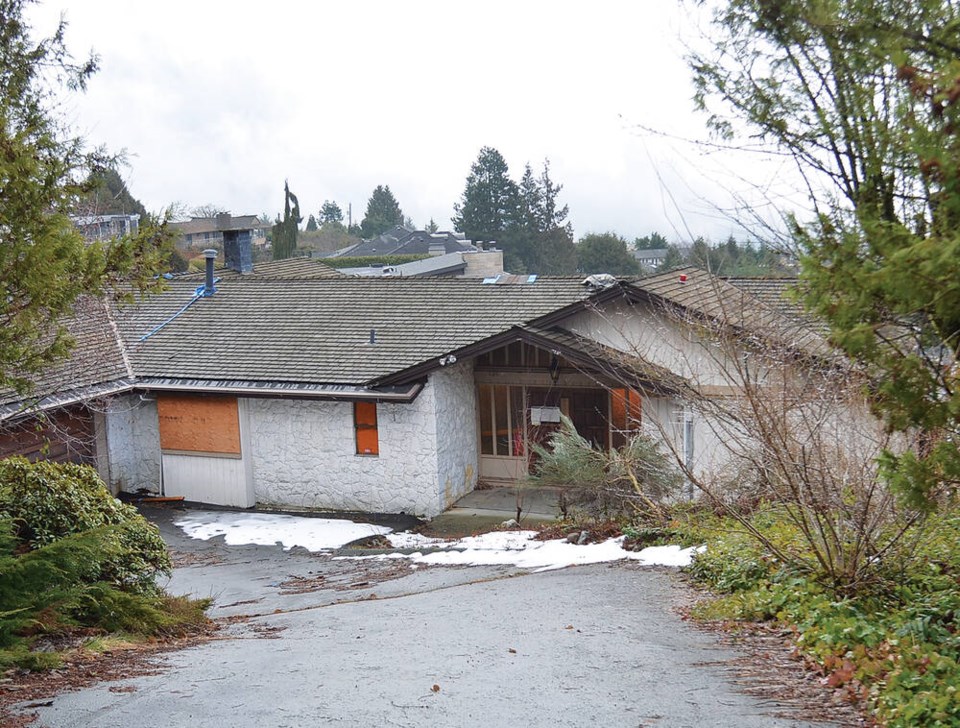The man arrested for running a drug lab out of a British Properties home is facing up to two years in prison.
Residents around the home at 1318 Crestwell Rd. called 911 in the early morning hours of March 7, 2022 after an explosion and fire rocked the neighbourhood.
When police arrived, they found a shirtless man outside who informed them he had been cooking MDMA in the kitchen.
Gerald Terrance Yaremchuk, 58, was later charged with 11 counts under the Controlled Drugs and Substances Act.
Yaremchuk was in Vancouver Provincial Court Thursday to plead guilty to one count of production of a controlled substance and two counts of unlawfully possessing precursor chemicals and equipment. The remaining charges of possession for the purposes of trafficking will be stayed.
Crown prosecutor Irene Sattarzadeh told the judge that Yaremchuk should face two years less a day in jail for his role in the cook house.
After the fire was out, the RCMP’s clandestine drug lab team conducted a search, which turned up a “large scale” operation with propane burners, drying ovens, reaction vessels, mixing trays, air filters, modified wiring, containers of chemicals, a pill press and scales.
In terms of actual drugs, they seized some ketamine and methamphetamine, almost 17 kilograms of raw MDMA, and 57,000 MDMA pills, which would be worth up to $450,000 sold individually on the street, the court heard.
There was also evidence the house, which was in a state of filth and disrepair including blood stains on the floors, had once been used as a cannabis grow op, the court heard.
Sattarzadeh said it was clear from text messages on Yaremchuk’s phone that he was an employee who was still learning the ropes, frequently providing batches of dubious quality and at least one being spoiled completed.
While his early guilty plea, lack of previous criminal record and his co-operation with investigators were mitigating factors in the sentencing, the size of the lab and the danger it posed to the community were aggravating ones, Sattarzadeh said.
“This was in a residential neighborhood,” she said. “There’s a risk always with clandestine labs, but this risk came to fruition so to speak. There was a fire. Inside the residence, there were chemicals, a propane tank, a not-to-code electric system and all of this made for a large public safety risk.”
Given the chemicals and haphazard production, Sattarzadeh said people buying the party drug would have been at considerable risk themselves.
“It’s quite terrifying to think that drugs made in this manner are being consumed by an unknowing, unwitting people,” she said.
A two-year sentence would be at the low end of the range for similar cases, Sattarzadeh said.
Yaremchuk’s defence lawyer, however, said his client should be able to serve his sentence through house arrest and probation.
Joel Whysall said Yaremchuk’s behaviour was an “isolated aberration,” and that he poses no threat to society if he is allowed to stay in the community.
At his hearing, the court heard that Yaremchuk began producing drugs in 2019 after becoming burnt out and despondent in his career as a commodities broker. He turned to the dealer who provided him with recreational cocaine for connections to find work in the drug world.
“He was being used. He was being used by people who are taking advantage of him to go and work in this dangerous and unsafe house, making this product for them,” Whysall said.
Although he had the right to remain silent, Yaremhuk voluntarily told police and firefighters about the chemicals in the house because he did not want to see any of them hurt while dealing with the scene.
“I think that speaks to his character,” Whysall said. “His true colours show that he’s a good person.”
Yaremchuk has legal employment lined up in his new home on Vancouver Island, Whysall said.
Yaremchuk is due back in court in January to set a date for sentencing.
Civil forfeiture case
Apart from the criminal process, the province is seeking to seize the Crestwell property under the Civil Forfeiture Act as the proceeds or instruments of crime. Court documents filed by the director of civil forfeiture identified the registered owner as Shuangfeng Deng, who the province alleges knew or was wilfully blind to what was going on in the house.
Deng has since filed a response denying the allegation and opposing the seizure. Deng bought the property with legal income and hired a realtor to rent it out, the response document states.
“If any tenant of the property used the property to produce illegal drugs contrary of any laws of Canada, Mr. Deng had no knowledge of this,” the court document states. “The forfeiture of the property is clearly not in the interests of justice. Mr. Deng did not directly or indirectly acquire the property as a result of unlawful activity. Mr. Deng was the rightful owner of the property before the alleged unlawful activity occurred and was deprived of control of the property by means of the alleged unlawful activity.”
The civil forfeiture allegations have not been tested in court.
The property was last assessed at just over $4.3 million.




